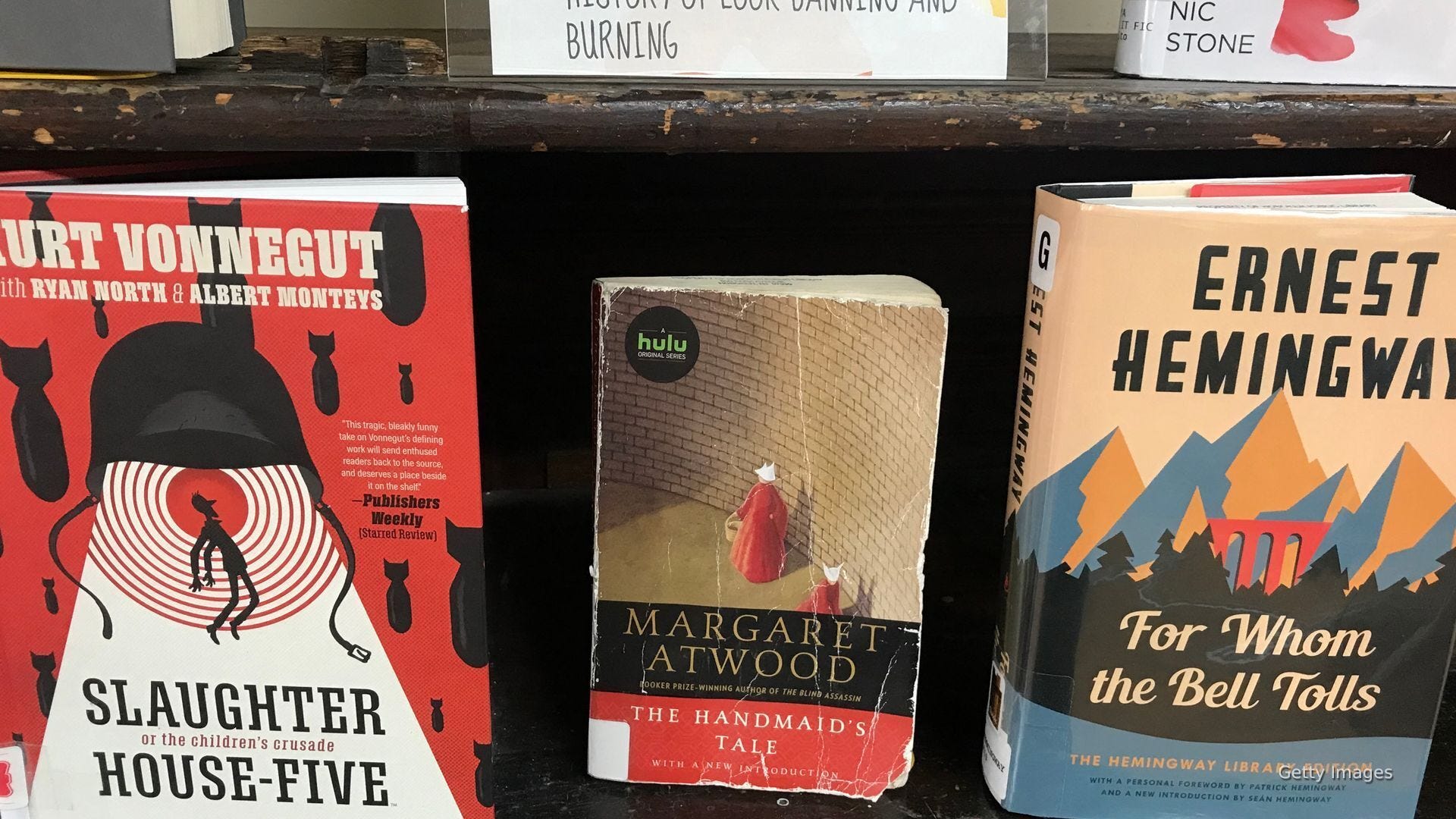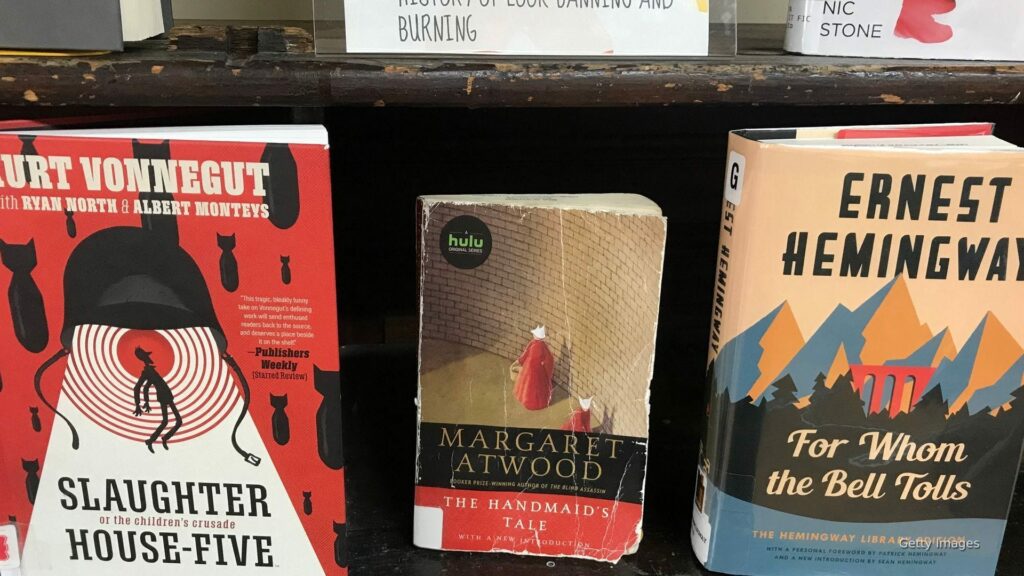
Major publishers and authors are suing Florida over its book ban law
Major publishers and authors are suing Florida over its law banning books deemed to have sexual content, saying the law violates free speech.
Straight Arrow News
Florida’s controversial legal argument defending book bans is expanding, pushing beyond school libraries into public libraries.
After arguing for more than a year on behalf of Gov. Ron DeSantis’ administration that school officials can remove any books for any reason, including objections to LGBTQ and race-related content, attorneys for the state now are making the same defense for community libraries — in Texas.
The Florida Attorney General’s Office joined 17 other red states in filing a court brief defending a Texas county’s removal of 17 books from its library system. They claim that book removals are “government speech” and therefore don’t violate others’ First Amendment rights.
The legal doctrine is essentially a First Amendment exception that says governments can discriminate based on viewpoint or content when they speak for themselves.
Next week, Florida Solicitor General Henry Whitaker will argue that before a federal appeals court in New Orleans. To make this happen, Llano County – located in Central Texas, population 22,540 – ceded some of its speaking time to Florida.
“The county’s decisions over which books to offer its patrons in its public libraries, at its own expense, are its own speech,” the states wrote in their August filing to the U.S. Court of Appeals for the Fifth Circuit, which includes Louisiana, Mississippi and Texas. (Public libraries are publicly funded.)
“The government does not violate anyone’s free speech rights merely by speaking — no matter what it chooses to say or not to say,” they continued.
Next week, notably, is also “Banned Books Week.” It’s a decades-old event held by librarians and free speech advocates to spread attention about books that have been targeted in school and community libraries.
Some of those advocates have told the appeals court that it should uphold a district court’s preliminary ruling rejecting the government speech argument.
“A Democratic governor could not order the removal of all library books advocating ‘Republican’ ideals, nor could a predominantly Jewish city council ban all copies of the New Testament to impose a single religious view,” wrote the American Civil Liberties Union and its Texas chapter in an early September filing. “This is clear not only from common sense, but also from First Amendment doctrine.”
More on what is the ‘government speech’ doctrine
Florida has seen a multitude of lawsuits on school book banning and related policies.
Attorney General Ashley Moody’s office has defended DeSantis’ education officials and local school officials, invoking the government speech defense: “Public school systems, including their libraries, convey the government’s message,” Moody wrote in one of the filings.
It’s a relatively new legal doctrine, and the U.S. Supreme Court has not always ruled in favor of it, though justices in 2015 said Texas could refuse to allow Confederate flag specialty license plates because they represented government speech.
In one of the Florida cases, U.S. District Judge Allen Winsor, appointed by President Trump, said how the doctrine applies to school library books is “surprisingly unsettled.” He’s not made a ruling on it yet.
But Texas U.S. District Judge Robert Pitman, appointed by President Obama, ordered the county the removed books last year, writing that those suing “have sufficiently alleged that Defendants’ actions do not constitute government speech and that Defendants unlawfully removed books based on their viewpoint.”
The books removed ranged from ones about farts to ones about racism and LGBTQ topics. County residents who used the local library system filed the lawsuit.
The district court’s decision was appealed by the county. A conservative three-judge panel of the U.S. Court of Appeals for the Fifth Circuit agreed in part with the original ruling, saying eight of the 17 books had to be returned.
“We agree that library personnel must necessarily consider content in curating a collection,” it wrote in its June decision. “However, the Court has nowhere held that the government may make these decisions based solely on the intent to deprive the public of access to ideas with which it disagrees. That would violate the First Amendment and entirely shield all collection decisions from challenge.”
But U.S. District Judge Stuart Kyle Duncan dissented, slamming the other two conservative judges as “Federal Library Police.”
“There is a simple answer to the question posed by this case: A public library’s choice of some books for its collection, and its rejection of others, is government speech,” wrote Duncan, who was appointed by Trump.
A majority of the 17-member appeals court tossed that decision and ordered a rehearing, setting up the Tuesday morning hearing where Whitaker will appear.
“Our office is routinely involved with amicus briefs, especially when they involve state issues,” said Kylie Mason, Moody’s spokesperson, in an email. “It is also not unusual for us to appear at an argument when we draft a (friend of the court) brief.”
Mason said the crafting of the court brief came at no extra cost to the state, since “there is no additional cost for a salaried employee to help draft a brief,” but did not answer price questions about travel.
The Florida Freedom to Read Project, a book access advocacy organization, warned the public in a social media post to “pay attention” to this case: “They will keep presenting this ridiculous argument until they find a friendly court,” it wrote.
From school libraries … to public libraries
Most of the book banning controversies in Florida have surrounded school shelves. Unlike in Texas, community libraries have largely avoided the controversy.
But the USA TODAY NETWORK – Florida reported last year that this was beginning to change. That change has accelerated in recent months.
For example, the Pasco County library system recently pulled 130 children’s books for review, according to the Tampa Bay Times. County officials decided which books to put on that list by, in part, key word searching terms such as “LGBTQ.”
One of the titles, “And Tango Makes Three,” is a children’s picture book that’s based on a true story about a same-sex penguin pair raising a chick together.
Yet, just last week, school officials who removed it from school shelves in Nassau County put it back after getting sued. They emphasized in a settlement agreement with its authors that “And Tango Makes Three” is appropriate for all ages and has educational value.
“Pasco County Libraries is committed to fostering an environment where all customers can access a broad range of ideas and information,” Sarah Andeara, a county spokesperson, in an emailed statement. “As part of the county’s effort to ensure our collection meets state standards, we have pulled for reconsideration certain materials in our collection.”
And this is likely to continue – until, at least, higher courts weigh in on Florida’s government speech argument.
“Regardless of whether book-banning campaigns target the Bible or Judy Blume, politicized efforts to restrict access to information cannot be reconciled with the Founders’ faith in the free exchange of ideas and our national commitment to freedom of expression,” wrote the Foundation for Individual Rights and Expression in a brief for the Llano County case.
“These battles will persist until the courts declare that the only way to win is not to play.”
Financial cost of book bans: Florida school board pays over $100K to defend ban on book about same-sex penguin pair
Stephen King slams Florida book banning: Stephen King had a 3-word reaction to news his books are banned in some Florida schools
This reporting content is supported by a partnership with Freedom Forum and Journalism Funding Partners. USA Today Network-Florida First Amendment reporter Douglas Soule is based in Tallahassee, Fla. He can be reached at DSoule@gannett.com. On X: @DouglasSoule.
Source link : http://www.bing.com/news/apiclick.aspx?ref=FexRss&aid=&tid=66f30c86633b4de79f617d8cabd2887c&url=https%3A%2F%2Fwww.statesman.com%2Fstory%2Fnews%2Fpolitics%2F2024%2F09%2F19%2Fflorida-to-argue-for-texas-book-bans-in-federal-court-out-of-state%2F75251546007%2F&c=2687505517170340038&mkt=en-us
Author :
Publish date : 2024-09-18 13:00:00
Copyright for syndicated content belongs to the linked Source.
